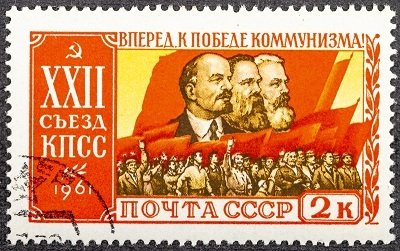

Karl Marx's view on Labour and society is how the infrastructure determines the superstructure, and Durkheim's view is about the division of labour to upgrade the economy. Marx explained the nature of labour determines the standard of each individual. In the division of labour, the labour puts so much effort into the product that in return the capitalist gains more profit. He classifies society into ancient, feudal and capitalist societies. Durkheim identifies society in two forms, Mechanical solidarity and organic solidarity. He explains how each work needs to be divided among the specialised category people to get a better result.

RUSSIA - CIRCA 1961: Postage stamp issued in the Soviet Union with the image of Workers and banners with portraits of Karl Marx, Friedrich Engels, Vladimir Lenin.
Division of Labour in society means how work is distributed to different individuals based on their specialisation in which they perform the tasks efficiently. For example, In a school, each teacher does their work efficiently to get the overall percentage in the public exams. There are different types of division of labour
When the same work is divided and assigned to complete the task together, it is called a Simple division of labour.
Example: Farmer, Tailor
When different kinds of work are assigned to workers who are specialised in that particular work, it is called a Complex division of labour.
Example: Subject teachers in a class.
When different countries specialise in producing a specific type of goods, it is called the International division of labour.
Example: Strawberries are produced more in France.
According to Karl Marx in the Division of Labour,
The works are divided, and a group of people skilled in any particular way cannot learn the overall process of producing a complete thing.
For example, in the manufacturing of watches, an individual knows to make glasses for a watch only skilled in making that he cannot learn the whole process of making a watch.
A man cannot be described or grouped based on two ideas: what they are producing and how they produce it. Division of labour creates classification between people that makes groups and affects human unity.
Marx identifies society in the following categories,
In ancient society, the owner can sell or kill the slave in which the labour is the property of the owner.
In feudal society, the land and animals are the most important means of production; here the tenants can use the land but the final decision in the sharing of the crops yield are in the hands of the landowner.
In a capitalist society, the capital and the machines are more significant. The bourgeois controls the production and preliterates are the labourers.
According to Emily Durkheim in the Division of Labour,
The division of Labour makes an individual to be specialised in a particular field and as a result, the product made by specialists will be of better quality.
He also feels that with specialisation in a particular field, the people in the same group share the same social solidarity.
He mainly focused on economic development, if each labour works efficiently on their allotted work the economical class will improve.
Durkheim describes social solidarity into two types
Mechanical Solidarity represents the ancient people or pre-modern people in which, a group of people who are not interdependent, and the people have common beliefs and perform the same kind of work.
Organic solidarity represents the urban in which each person is interdependent, and it's more complex. Each individual is distinguishable from others. For example, Doctors, Engineers, Farmers, etc.
| Durkheim’s Labour and Society | Marx’s Labour and Society |
|---|---|
| The Economic view is required to upgrade from Mechanical to Organic Solidarity. | Non-economic view, which helps to value each human as a peer person. |
| The Division of Labour makes each person specialise in a certain field. | The division of labour makes individuals work on the same thing repeatedly, and they cannot learn the whole process. |
| Each group of people perform the same kind of work from social solidarity. | Each individual is valued only based on what kind of work is allotted to them and what they produce. |
| Example: A silk saree maker who is a specialist knows to weave the saree in the best way. | Example: The weaver gets fewer wages for his work, and the capitalist who invested to buy the silk sells the product at a high margin. |
Both Durkheim and Marx have different opinions on Labour and society. According to Durkheim, The separation of work to each individual and allotting the work according to the specialised skill makes the work more efficient. Each individual gets specialisation in a particular field and hours, and economy to the developed one. According to Marx, each individual is categorised based on the work they do, and this causes inequality among human beings. The division of Labour separates people from one another, and it's a capitalist way of production.
Q1. What is the Labour theory of value?
Ans. A Product’s value is measured by how much labour it takes to produce under normal conditions. Labour is measured in time, hours, and minutes: The more labour time it takes to make something, the more valuable it is. That’s why the product becomes cheaper when it is made automatically.
Q2. What is Social Solidarity?
Ans. The word solidarity means the similarity or having the same kind of interest, that is, a group of people share a common interest or common belief. Social solidarity is how each individual is interdependent on other humans, with or without knowing it.
Q3. What is Repressive Law?
Ans. Repressive Law is used in the Mechanical form of society, in which the punishments given are severe. As the whole society has the same beliefs, where the punishment is not given according to the victim.